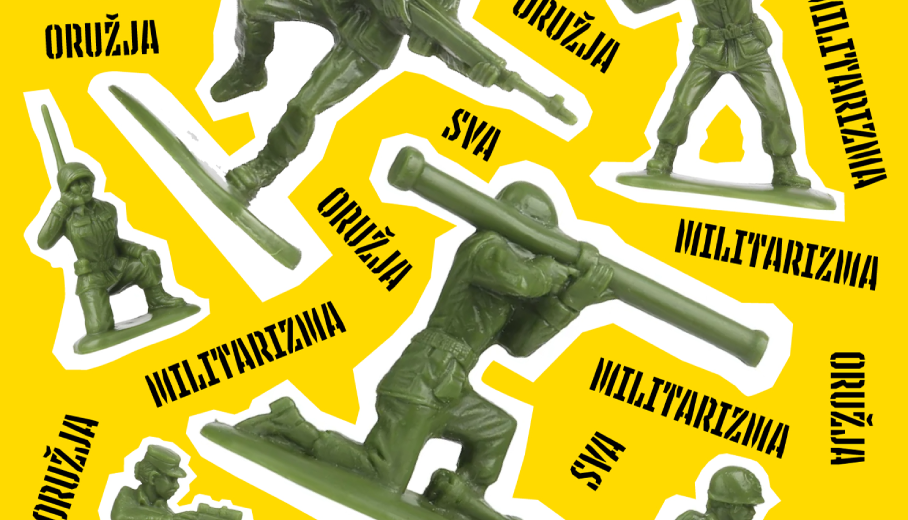12th Environmental Film Festival: All Weapons of Militarism
The activist group of Zelena akcija/FoE Croatia invites you to the 12th E?! – Environmental Film Festival (OFF) which will be held from April 24th to 26th at the Kinoteka Cinema in Zagreb (Kordunska 1). The entrance is free!
Subtitles will be in English and Croatian, to make it accessible to everyone, and this year the festival is for ages 16+.
At this year’s festival, we want to expose how the capitalist system shows its violent face through militarism. Therefore, we will thematise various „tools“ that militarism uses to maintain control over people and natural resources, while filling their own pockets.
Hence the name of the festival – „all weapons of militarism“. These weapons include: military occupations, militarisation of borders and police, fascism, nationalism, imperialism, neocolonialism, fossil fuels and minerals (including those for renewable energy technologies), artificial intelligence etc.
What to expect in the programme
At the 12th OFF, expect:
- 7 documentaries
- 1 feature film
- 2 premieres
- a panel discussion
- musical opening with Diyala, an industrial hip-hop artist with Palestinian roots, accompanied by DJ LucyLyu
We open the festival with the premiere of the powerful documentary "Where Olive Trees Weep" (2024), which offers a look at the struggle and resilience of the Palestinian people under Israeli occupation. It explores themes of loss, trauma and the search for justice. This emotional journey reveals the humanity of the oppressed while grappling with the question: what makes the oppressor so ruthlessly blind to his own cruelty?
We will continue with the documentary "Sudan, Remember Us" (2024), directed by Hind Meddeb. The film records the revolution and overthrow of Omar al-Bashir in 2019, as well as the civil war that followed. What gives the film its uniqueness and strength is the portrayal of young people who use art and poetry as a means of resistance and expression of their desire for freedom and justice.
We will get to the root causes of warfare with the documentary film "Blood and Oil" (2008), in which the bestselling author and correspondent of the Nation magazine, Michael T. Klare, exposes the true motives of American military engagements in the Middle East and imperial aspirations – oil. This resource has been at the center of American foreign policy for more than 60 years – making contemporary energy and military policy virtually inseparable.
In addition to fossil fuels, today’s conflicts are also fought over rare minerals. This is what the documentary film "This is Congo" (2017) is about, providing an impressive and unfiltered look at the world's longest conflict and the people who survive it. Following several characters, the film offers a Congolese perspective on the situation and reveals the insidious legacy of colonialism, resource exploitation and genocidal wars that have created an endless cycle of violence.
Some of the other „weapons“ of militarism, which we will get to know through the movies, are the police and borders. Craig Atkinson’s documentary "Do Not Resist2 (2016) explores the growing militarisation of the US police, particularly in the suppression of protests. It deals with the topics of racism, police brutality and inequality in the application of the law, emphasising how the militarisation of the police contributes to the further marginalisation and criminalisation of African Americans.
The impressive feature film "Europa" (2021), directed by Haider Rashid, follows the story of a young Iraqi man, Kamal, who is trying to reach the „Fortress of Europe“. Through his struggle for survival, which you cannot remain indifferent to, the film explores the themes of migration, hope, loss and the search for freedom.
On the other hand, we will show a different film and a unique story. The documentary “A Bold Peace: Costa Rica’s Path of Demilitarisation” (2016) explores the history of Costa Rica, which in 1949 made the decision to abolish its army – as the only one in the world – and how that decision shaped its politics for the next 70 years.
We close the festival with the premiere screening of the film “Yintah” (2024), which thematises militarised police violence in the name of gas expansion and pipeline construction in Canada. The story spans a decade and follows Howilhkat Freda Huson and Sleydo’ Molly Wickham as their nation defends their ancestral land from the Canadian government and several of the largest fossil fuel companies in the world. In dark and difficult films, we will expose all the rottenness of the system, but at the end of the festival, we still want to give a glimmer of hope and show how people, despite oppression, do not give up and show how the strength of the spirit and the desire for justice overcome everything.
All films will have Croatian and English subtitles. A detailed programme is available on the festival’s website and in the Facebook event.
Why did FoE Croatia decide to address this topic?
FoE Croatia is celebrating its 35th anniversary this year, and on this occasion we wanted to remind you that our organisation originated from the anti-war movement and peace initiative Svarun. For those who don’t know, at the beginning of the war in Croatia in the 1990s, some activists and members of FoE Croatia actively participated in the anti-war campaign. With the call that Zelena akcija sent out to all people of good will on July 4th, 1991, the anti-war campaign „Let’s prevent war!“ began. For the first few months, the campaign’s secretariat functioned from FoE Croatia’s office.
This legacy is crucial to us today, as is the deep sense of social justice that is inseparable from the fight for environmental protection and that permeates our work. Therefore, we recognise the intertwining of different struggles, including the anti-militarist one. We believe that the fight for climate justice goes hand in hand with the fight against militarisation, the military industry, and wars that kill both people and the planet.
